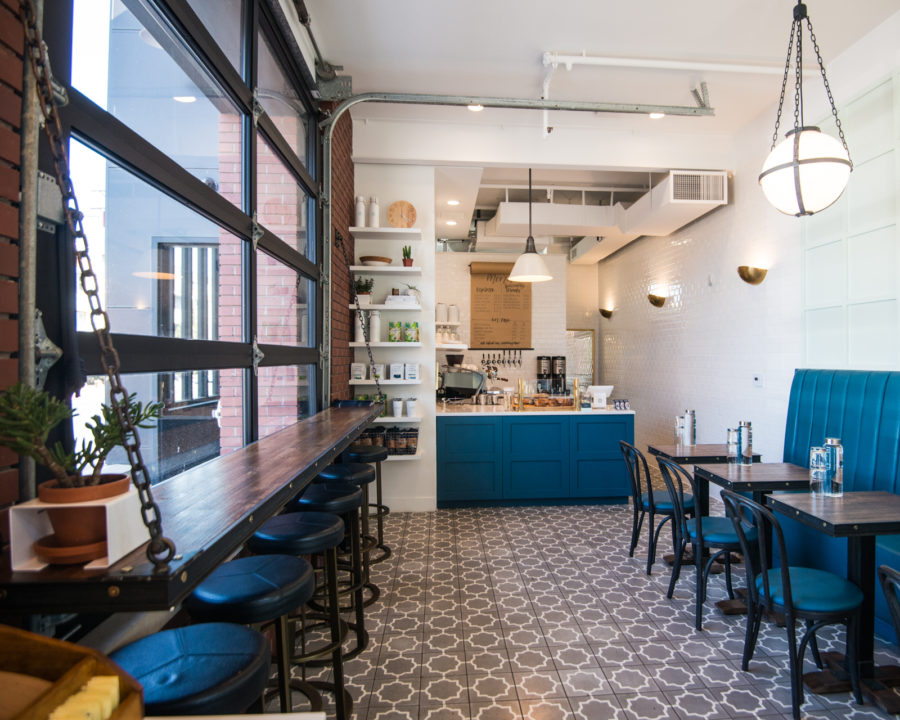The Local newsletter is your free, daily guide to life in Colorado. For locals, by locals. Sign up today!
Earth Day is upon us, that annual reminder to do better by the world around us and live more sustainably. This year, in addition to carpooling more often, turning off the lights as we leave the room, and (finally) committing to composting, let’s infuse a little love into that most sacred of morning rituals: coffee. Here are ways Colorado java shops are helping us in our quest to drink a greener cup.
Natural Processing
As a Public Benefit Corp, Bivouac Coffee’s commitment to environmental and social responsibility isn’t just a part of their business; it’s foundational. Of course your java comes in a compostable cup and your beans come in a compostable bag, but where Evergreen-based Bivouac’s Earth-first ethos really shines is its exclusive use of naturally processed coffee beans. This means that the coffee bean was sun-dried within its cherry, rather than “washed off” in a water-intensive process that uses 7.9 liters of water per 12-ounce cup—the equivalent of 4.4 days of drinking water for one adult human. “By starting at the source…with a really sustainable practice and sourcing a sustainable style of coffee, we can use that as our base and then build upon that,” says operations manager and head roaster Scott Wilton. “It’s starting at the core with the product itself, that’s where we feel like we can have the biggest impact.”
That's only $1 per issue!
Zero-Emissions Roasting
Consistent, craft-quality coffee through an electric, zero-emissions roasting process: That’s the promise behind the Bellwether Roasting System. Compared to a traditional gas roaster, the Bellwether system claims to reduce the carbon footprint of coffee roasting by 87 percent. Given the system carries a hefty $75,000 price tag, we don’t suggest trying this at home. Instead, visit a Denver coffee shop like Sojourners Coffee & Tea or Cake Crumbs Bakery & Cafe that uses the system to roast beans in-house.
Glass To-Go Jars
Each year, Americans discard 58 billion single-use paper coffee cups. And while the vessel was incredibly useful for the 20 minutes it took us to drink our latte on the way to work, the sad fact is that the cup’s decomposition process is likely to take longer than our lifespan. Unravel Coffee is working to put a dent in that damage by using glass jars instead of paper cups as their on-the-run containers. Drinks are served in a glass jar, and for a $0.50 deposit, customers can take the glass jar to go. Bring it back again and Unravel will exchange your old cup for a new one at no charge. Kyle Lopez, director of Unravel operations, reports a 60 to 70 percent exchange rate at their Denver location, though the figure is a bit lower for the more transient clientele of their Breckenridge, Vail, and Winter Park locations. “We always stress to reuse the jar for something in your life if you’re not able to return the jar,” he says. “It definitely becomes more of a keepsake in this case.”
In-House Production
Packaging from many non-dairy milk products has a wax coating, meaning the containers aren’t recyclable. “That’s the bulk of our garbage from a coffee shop standpoint—all those darn cartons,” says Stephany Traylor, owner of Steamboat Springs–based Dusky Grouse Coffee. To combat that waste—and save a bit of money in the process—Traylor makes nut milks as syrups (which also come in disposable packaging), in-house and stores them in reusable glass containers. Dusky Grouse also composts all of its coffee grounds. “Doing the bigger stuff like composting and working on reducing our waste is going to work in our shop financially; it’s going to work for the planet; and it’s a good role model for the community,” Traylor says.
Complete Transparency
Going out on a limb, we’re willing to bet you’ve never come across a coffee shop’s energy bill while perusing their website. Yet that’s exactly the type of information Blue Sparrow Coffee offers up freely in its no-holds-barred 2022 sustainability report (the report’s title is intentionally crossed out to represent the work left to be done). In its waste, water, and energy audits, Blue Sparrow arrived at a baseline against which it can measure future progress. “Just by existing, we’re starting at quite a deficit on the environmental front,” says owner Jeffrey Knott. But understanding where they are just serves as motivation to get better. “Talking about [sustainability] publicly is important. It will hold us accountable. … Before we could even choose what to work on, we needed to really understand our business and the impacts from it.” A couple initiatives on tap for 2022: composting 100 percent of the coffee grounds at both Denver locations and charging $0.10 per single-use cup (rather than discounting) since a fee is shown to be more effective at increasing reusables.

Starting Conversations
When Laurie Benson and her husband Joel started the Buena Vista Roastery in 2011, they did so with the intention of using coffee as a vehicle for change. “The potential for impact begins with the health of the land that holds the seeds, then [moves] to the community of farmers and families, all the way through the production chain to the individual sitting at home enjoying a cup,” she says. “If we don’t honor and support every person and ecological element that is a part of the process, everything begins to collapse.” So in addition to sourcing 100 percent organic and Fair Trade coffee, the roastery’s Coffees for a Cause program supports organizations that enhance their local and global communities through the sale of specific coffees. “The money given to the partnering organizations is important,” Benson adds, “but of greater importance is the awareness it creates for all of those making a difference in our world.”
[Read Denver’s Best Coffee Shops]










